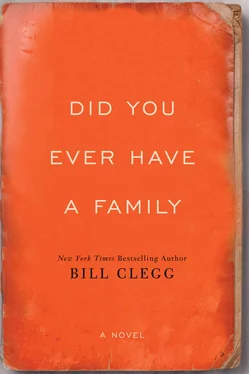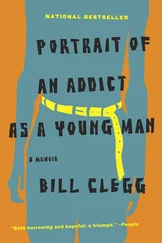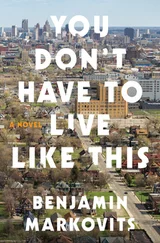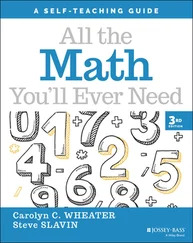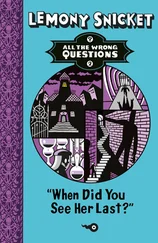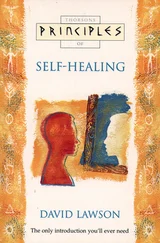Bill Clegg
Did You Ever Have A Family
For Van, and for our families
You should have
heard him,
his voice was
unforgettable, irresistible, his voice
was an imaginary garden woven through with fragrance.
Did you ever have a family?
Their eyes are closed.
That’s how I know
we’re there
inside it,
it’s made of sound and steam
that weaves between dark
dining room, bright kitchen.
We’re there because I’m hungry,
and we’ll all be eating soon
together, and the hunger’s sweet
— Alan Shapiro, “Song and Dance”
He wakes to the sound of sirens. Many, loud, and very near. Then horns: short, angry grunts like the buzzers signaling time-out in the basketball games he watches but does not play in at school. His cell phone says 6:11 a.m., but the house downstairs is awake and loud and from the particular pitch of his mother’s rough morning voice, scratching above his father’s and sisters’, he knows something is wrong.
Before he kicks off the covers, Silas grabs his yellow knapsack from under the bed. He pulls out the small, red bong his friend Ethan gave him last month for his fifteenth birthday along with a bag of pot he smoked in less than a week, mostly on the job yanking weeds from flower beds and patios for rich New Yorkers. He selects a green bud from the small, gray Tupperware container where he keeps his stash, carefully pinches it in half, and presses the larger piece into the metal bowl. He grabs the half-filled water bottle sitting on his nightstand and pours a few inches into the bong before lighting. As he inhales, he notices the smoke curl toward his mouth, thicken in the red tube, and turn, slowly, like a sheet twisting underwater. Once the bud has mostly turned to ash, he pulls the stem from the bong and releases the smoke to his lungs. The water gurgles at the bong’s base, and he is careful to inhale gently to minimize the noise. He opens the window, snaps off the screen, and leans out, exhaling in one full, sloppy breath.
He watches the smoke float before him, catch the wind, vanish. He feels the cool air against his face and neck and waits for the pot to work its magic. The sky is pink and pale blue, and he traces a long trail of plane exhaust above him until it disappears over the roofline of the garage. The streaks are fluffy and loose, and so he thinks the plane must have flown over hours ago, before daybreak. To where? he wonders, the drug beginning to lozenge his thoughts.
Below him, four beefy crows land gracelessly on the lawn. He watches them hop and step and tuck their wings into their chest-thick bodies. They are the size of house cats, he thinks as he follows their quick, mechanical movements. After a while and for no apparent reason, they stop and stand perfectly still. He cannot see their eyes, but he senses they are staring up at him. He stares back. They cock their heads from side to side as if making sense of what they see. Wind ruffs their feathers from behind, and after a few hops they take flight. Airborne, they appear even larger, and for the first time he considers whether they might be hawks, or vultures. Then, as if unmuted, birds of all kinds squawk and screech and chirp from every direction. Startled, Silas knocks the back of his head against the top of the window. He rubs the spot and leans farther out. Another siren, different from the others — higher pitched, more upset — screams from far off. He tries to locate the crows that have disappeared into the complicated morning sky. What he finds instead are familiar shapes in the streaks and billows: a mountainous pair of swelling breasts, cat-eyed sunglasses, a fiery bird with vast wings. Then he sees what looks like nothing but what it is: smoke, pitch-black and thick, rising behind the roofline. At first he thinks his house is on fire, but when he leans out and looks back, he can see that the smoke is coming from beyond the trees on the other side of the property. Then he smells it — the oily stench of a fire burning more than just wood. He can taste it, too, and as he inhales, it mingles with the pot smoke still on his tongue and in his throat. The birds get louder. Squawking, yelling what sound like words. Go! You! Go! he thinks he hears, but knows it’s impossible. He blinks his eyes open and shut, attempts to process each thing: the smoke, the smell, the birds, the sirens, the magnificent sky. Is he dreaming? Is this a nightmare? Is it the pot? He got it from Tess at the farm stand up the road, and her stuff is usually mellow, not like the trippy buds he and his friends drive an hour and a half south to score in Yonkers. He wishes he were having a nightmare or hallucinating, but he knows he’s awake and what he sees is real.
At the tree line on the other side of the house, smoke pumps into the sky like pollution from a cartoon smokestack. It puffs and thins, puffs and thins. Then a terrible cloud, larger than the rest, swells from the same unseen source. It is dense, coal black, and faintly silver at the edges. As it rises, it expands into a greenish gray and then dissolves into a long, crooked wisp that points across the sky like the worst finger.
Silas backs away from the window. Still wearing the shorts and T-shirt from the night before, he slips on his old, gray-and-white New Balance running shoes, the ones he wears when he works his landscaping jobs or stacks firewood with his father. He looks in the mirror above his dresser and sees that his eyes are pinkish, bulging slightly, and his pupils are dilated. His unwashed-for-days, dark blond hair is jagged and oily, flat to his head in some places, standing on end in others. He rubs a stick of deodorant on his armpits and puts on his black, corduroy, Mohawk Mountain ski cap. He swigs the remaining water from the bottle by the bed and shoves a few sticks of Big Red gum in his mouth. He grabs the yellow knapsack and packs up his bong, his lighter, and the small Tupperware container. He rubs his eyes with both fists, breathes in deeply, exhales, and steps toward his bedroom door.
His thumb and forefinger graze the knob, and he remembers the night before, where he was and what happened. He steps back, traces his last movements before falling asleep, runs through it all once and then again to make sure it is not a dream he is remembering. He considers and then dismisses the possibility of taking another bong hit before leaving his room. He stands still, speaks to himself in a whisper. I’m okay. Everything’s okay. Nothing’s happened .
Downstairs, his mother’s iPhone rings innocently, like an old-fashioned phone. She answers on the third ring and the house falls silent. The only sounds now are the tireless sirens, the grunting horns, and the distant hum of helicopter blades beating the air. From the kitchen, his father shouts his name. Silas steps away from the door.
She will go. Tuck into her Subaru wagon and roll down these twisting, potholed country roads until she finds a highway, points west and away. She will keep going for as long and as far as possible without a passport, since the one she had no longer exists. Her driver’s license, along with everything else that had been in the house, is also gone, but she figures she won’t need it unless she is pulled over for speeding. She had not planned on leaving this particular morning, but after she wakes and showers and slowly puts on the jeans and blue-and-white-striped, boat-neck, cotton jersey she has been wearing for weeks, she knows it’s time.
She washes and dries the chipped coffee mug, ceramic bowl, and old silver spoon she’s been using since she came to this borrowed house; feels the weight of each object as she places it carefully back in the cupboard or drawer. There is nothing to pack, nothing to organize or prepare. All she has with her is the clothing on her body and the linen jacket she wore eighteen nights ago when she rushed from the house. As she slowly pushes her arms through the worn sleeves, she tries to remember why she’d put it on in the first place. Had it been cold in the kitchen? Had she pulled it from the overwhelmed coatrack by the porch door before chasing into the field, careful not to wake everyone upstairs? She can’t remember; and as she starts reviewing the events of that night and the morning after, examining again each step with forensic attention, she forces herself to stop.
Читать дальше
